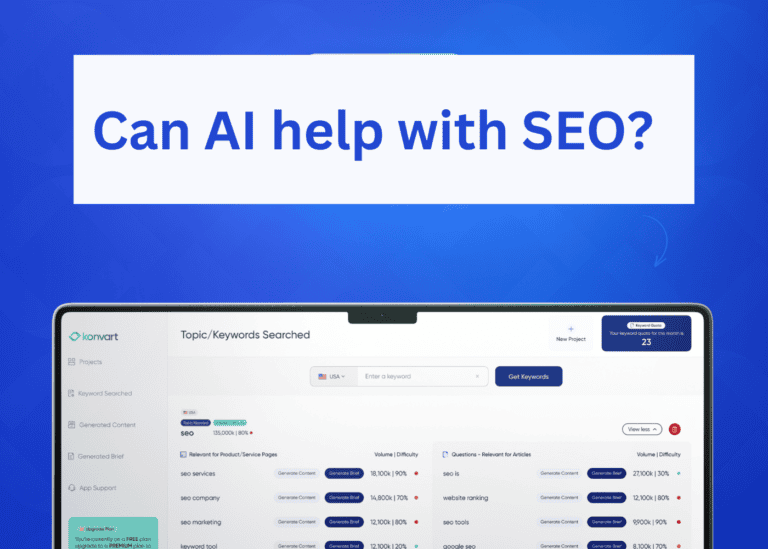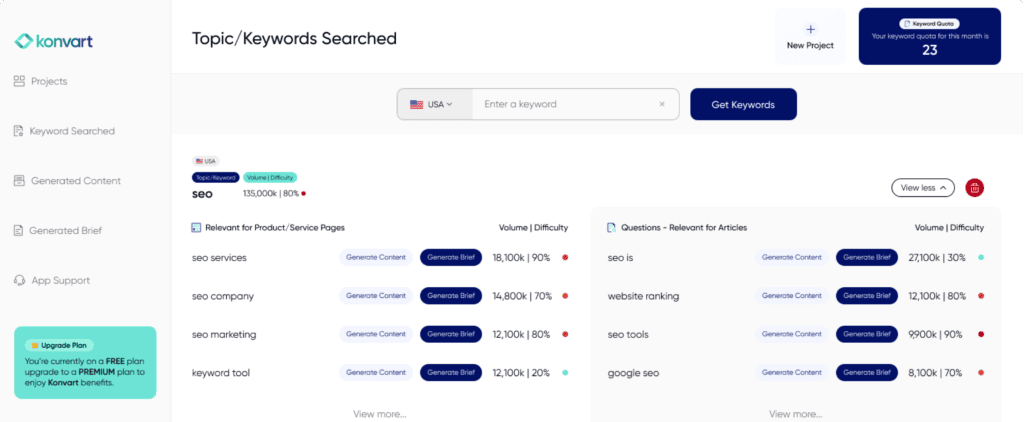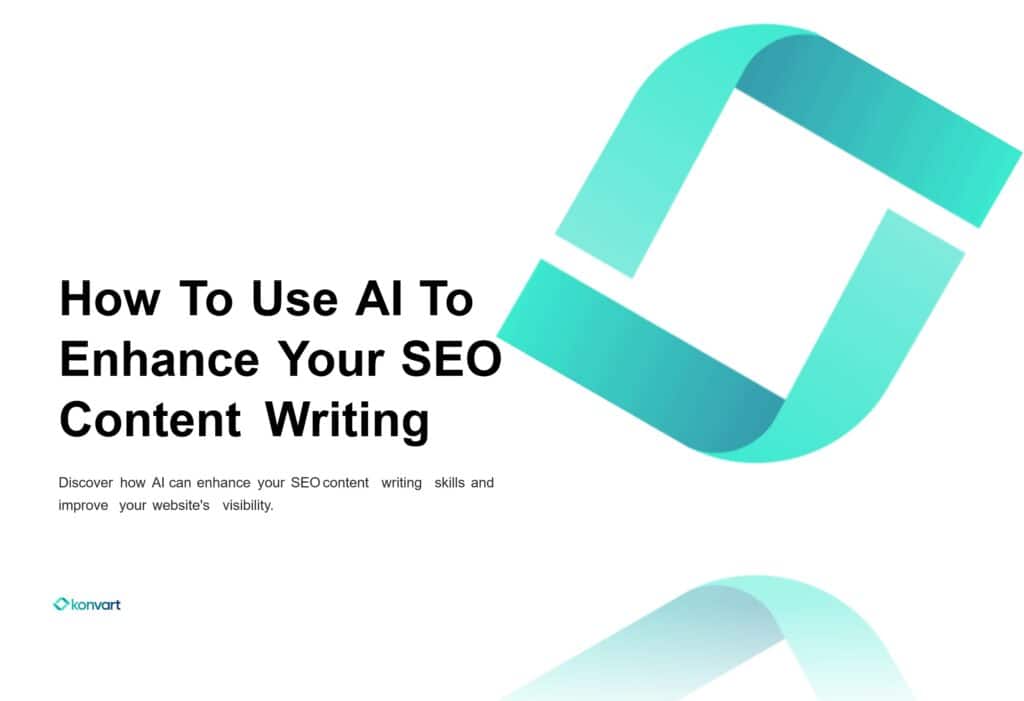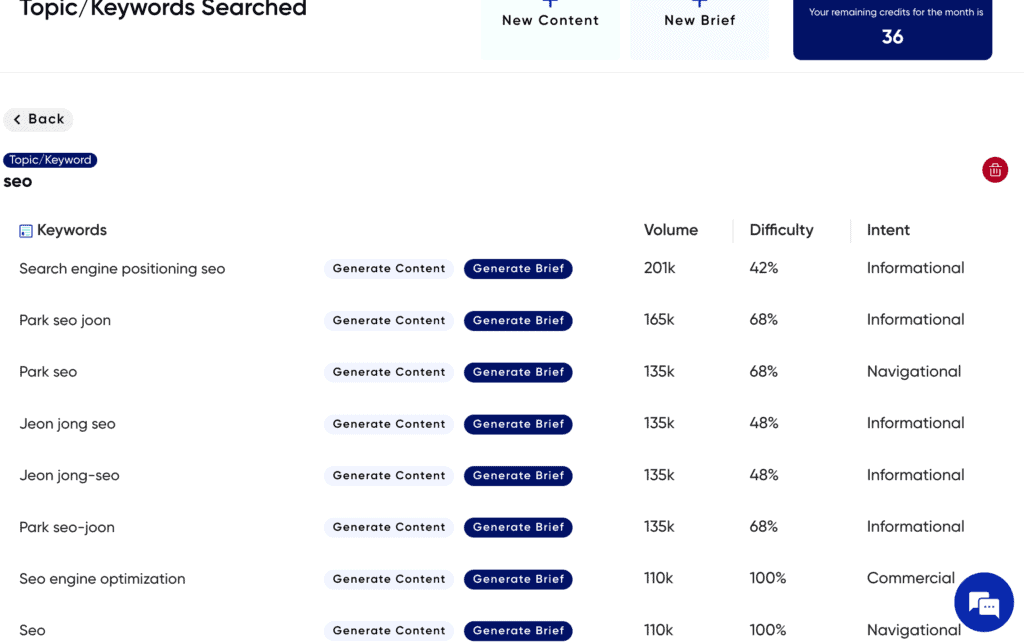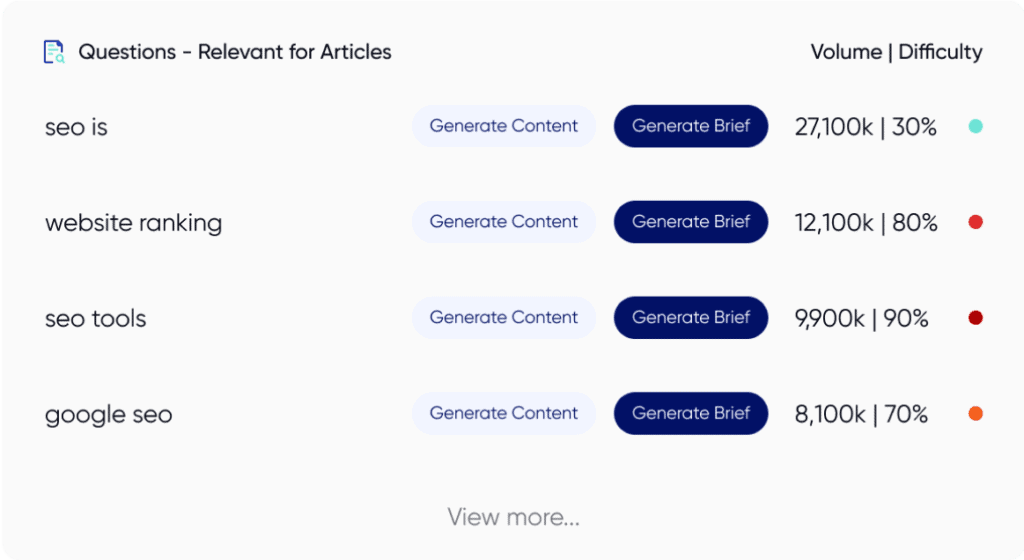The simple answer is Yes. Artificial intelligence is reshaping numerous fields, and search engine optimization (SEO) is no exception. As content writers and SEO executives seek more efficient ways to enhance their strategies, AI tools offer promising solutions. One example is Konvart, a tool for content planning and writing. This introduction of AI into SEO practices not only streamlines workflows but also improves the accuracy and effectiveness of content, potentially leading to better search engine rankings and user engagement. This article explores how AI can be valuable in optimizing your SEO efforts.
AI for SEO 101
Understanding AI for SEO begins with recognizing how artificial intelligence can enhance search engine optimization strategies. AI tools, such as Konvart, streamline the content creation process, making it quicker and more aligned with SEO best practices. These tools analyze vast amounts of data to identify trends and patterns that might escape human notice, thus providing insights that can significantly improve SEO performance.
One of the primary uses of AI in SEO is content optimization. AI tools can write entire content or suggest adjustments to existing content, such as altering meta descriptions or optimizing header tags to improve search engine rankings. They are also adept at ensuring content readability, suggesting changes that make text easier to read and more engaging for users, which is a factor that search engines consider when ranking content.
AI also plays a crucial role in understanding user intent. It can analyze search queries to determine what users are really looking for by digesting texts from your competitors, which helps in creating content that directly answers user questions or provides solutions to their problems. This alignment between user intent and content improves user experience and boosts SEO rankings as search engines favor content that best serves user needs.
Lastly, AI-driven analytics provide ongoing insights into SEO performance, allowing teams to make data-driven decisions quickly. Right now, you can use AI to interpret vast amounts of analytics data. You could export analytics from Google Search Console or Google Analytics and input it into an AI tool to quickly understand what’s working and what’s not.
By leveraging AI in these areas, SEO professionals can achieve more precise targeting, create higher quality content faster, and maintain a competitive edge in search engine rankings.
A Look into AI
Artificial Intelligence (AI) in search engine optimization (SEO) is not a recent innovation, yet recent years have seen a dramatic surge in interest and discussion around its capabilities and potential. This heightened attention can largely be attributed to advancements in AI technology and the increasing accessibility of AI tools that are reshaping how SEO professionals approach content creation and website optimization.
Historically, AI has been used in SEO for data analysis and predicting consumer behavior trends. These applications, however, were often limited to larger corporations with the resources to invest in sophisticated technology. Today, AI tools have become more affordable and user-friendly, enabling a broader range of businesses to benefit from AI-driven SEO strategies. This democratization of technology has sparked a renewed interest and enthusiasm in the SEO community.
The recent hype can also be traced back to the success stories and case studies circulated within the industry, showcasing significant improvements in search engine rankings due to AI integration. For instance, AI-powered content optimization tools can now analyze top-performing content across the web and provide recommendations for keywords, readability improvements, and content structure tailored to Google’s ever-evolving algorithms.
Despite the buzz, SEO professionals should approach AI with a balanced perspective. While AI can dramatically enhance efficiency and effectiveness in certain SEO tasks, it is not a standalone solution. Successful SEO strategy still requires a deep understanding of market trends, user behavior, and the human touch in content creation that resonates with audiences.
Integrating AI into SEO practices is indeed an exciting development but should be viewed as an enhancement to, rather than a replacement for, traditional techniques that prioritize genuine user engagement and adherence to SEO best practices. As technology continues to evolve, staying informed about these advancements will be key to leveraging AI effectively within the framework of holistic SEO strategy.
AI for SEO: Dos and Don’ts
When implementing AI in your SEO strategy, adhering to certain best practices while avoiding common pitfalls is vital. Here are the dos and don’ts that can help maximize the effectiveness of AI tools like Konvart in enhancing your SEO efforts.
Dos
- Leverage AI for Keyword Research and Optimization
You can use AI to analyze keyword research data from keyword research tools and uncover long-tail keywords and phrases that might not be immediately obvious. However, most AI tools do not provide search volume and keyword difficulty data, which is important when doing keyword research. So, you will need a keyword research tool as well. - Use AI to Enhance Content Relevance
AI can analyze top-performing content across the web to identify the themes and subtopics that resonate with audiences in your niche. By integrating these insights into your content creation process, you can produce material that is both informative and highly relevant to user queries, thereby improving your search engine rankings. You can also use AI to write well-optimized content. - Personalize User Experiences
AI can be used in chatbots and other areas of your website to improve user experience. If there’s one thing Google continues to emphasize, it’s user experience.
Don’ts
- Don’t Overlook Human Oversight
While AI can significantly automate and optimize many SEO tasks, human oversight remains critical. Always review AI-generated content and keyword strategies to ensure they align with your brand voice and meet quality standards before publishing. - Avoid Keyword Stuffing
Resist the temptation to overload your content with keywords simply because AI tools suggest those terms. Search engines penalize sites that engage in keyword stuffing as it detracts from the user experience. Instead, focus on integrating keywords naturally into well-crafted content. - Don’t Ignore Ethics in AI Usage
Ethical considerations should guide the deployment of AI technologies. Be transparent about how you use AI, particularly in data handling and privacy matters concerning user information – this is where your privacy policy and other legal documents come in. - Don’t Rely Solely on AI for Content Creation
While AI can assist in drafting initial content outlines or generating complete articles, it lacks the human touch necessary for refining content so it matches your brand tone to the T. Use AI as a tool to aid your content creation process but keep human creativity at the forefront of your strategy. This will ensure you cut down content writing time by hours without sacrificing branding.
By following these guidelines, you can effectively integrate AI into your SEO practices without falling into common traps that could potentially harm your site’s performance or reputation.
AI SEO Best Practices for Beginners
Leverage AI for Keyword Optimization
One of the initial steps in SEO is keyword research. Having found valuable keywords with tools like Konvart, you can utilize AI to analyze the search data and understand what your target audience is searching for. Konvart does this and can provide the results to you in a content brief or a well-optimized article.
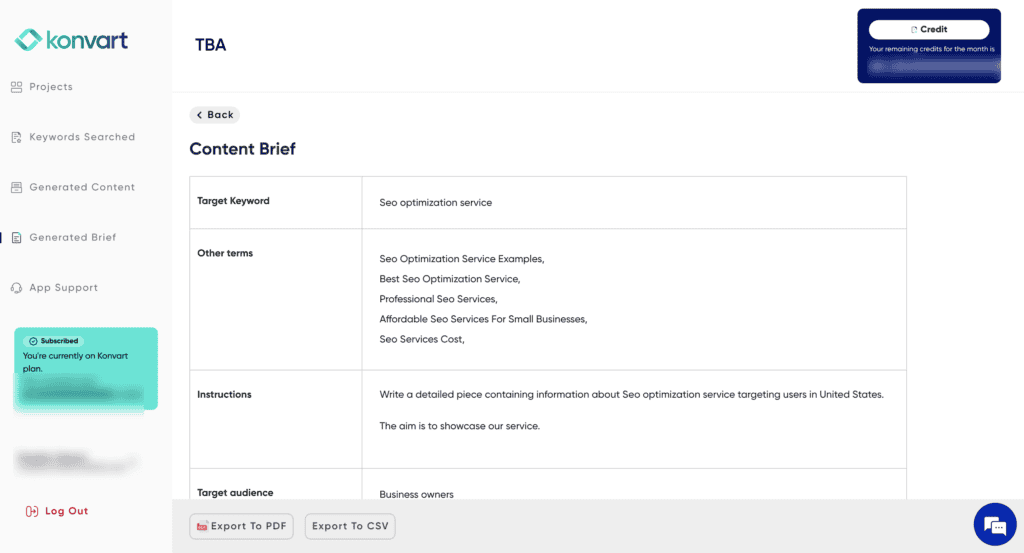
Enhance Content Quality with AI-driven Tools
Content quality plays a pivotal role in SEO success. AI can assist by suggesting grammar, style, and coherence improvements, making the text more engaging for readers. For instance, AI applications can help identify passive voice constructions that might obscure clarity, proposing more direct active voice alternatives. They also suggest synonyms to avoid repetition and maintain reader interest. Using these tools ensures that content not only ranks well but also meets the high standards readers expect.
Optimize for User Intent
Understanding and aligning with user intent is crucial for SEO effectiveness. AI tools analyze search engine result pages (SERPs) and provide insights into the types of content that perform well for specific queries. This analysis helps beginners understand whether informational, navigational, or transactional content is more appropriate for a given keyword. By tailoring content to meet user intent, websites are more likely to satisfy users, which in turn signals to search engines that the content is valuable, potentially improving rankings.
Automating Routine Tasks
AI in SEO automates repetitive tasks like competitor analysis, content briefs, and report generation. This automation saves valuable time for SEO professionals, allowing them to focus on more creative aspects of SEO strategy, like content creation and link building. Automation ensures that no critical tasks are overlooked and that strategies are implemented promptly.
AI SEO Tools Marketers Should Know
Exploring the vast array of AI SEO tools available can significantly enhance a marketer’s strategy and execution. Here are some AI-powered tools that should be on every marketer’s radar:
- Konvart: Konvart provides AI-powered content briefs to help marketers create relevant and highly optimized articles and product/service copy. Konvart also has AI writing and keyword research features. Learn more about how Konvart can help you here.
- Clearscope: Clearscope employs natural language processing to help marketers create content. It provides easy-to-understand content grading and recommendations that enhance readability and SEO performance.
- Surfer SEO: Surfer SEO now has an AI writer that users can use to craft content.
- Frase.io: Frase.io helps streamline the content creation process by automating the creation of content briefs and using AI to optimize content for answer boxes and other SERP features.
- WordLift: WordLift offers an AI-powered SEO solution that helps you build a knowledge graph for your website, which Google can use to better understand your content and improve your site’s visibility in search results.
You can find more AI SEO tools here. Each of these tools harnesses the power of artificial intelligence in unique ways to aid marketers in crafting strategies that are not only reactive but also proactive in nature. By integrating these tools into their workflows, marketers can better understand their SEO activities and refine their approaches based on predictive analytics and machine learning insights.
4 Ways to Improve Your Website with AI SEO
Artificial intelligence (AI) is reshaping the way we optimize websites for search engines. By integrating AI with SEO strategies, businesses can enhance their online presence significantly. Here are six effective ways to leverage AI for improving your website’s SEO:
1. Content Generation and Optimization
AI tools can automate the creation of well-optimized content by suggesting relevant topics, keywords, and structures that are more likely to rank higher in search engine results pages (SERPs). These tools analyze existing content across the web to identify gaps and opportunities in your content strategy. For instance, AI-driven platforms like Konvart help in generating content that is not only rich in quality but also tailored to the SEO needs of your website.
2. Voice Search Optimization
With the rise of digital assistants, optimizing for voice search has become a key component of modern SEO strategies. AI can help optimize your content for voice queries by focusing on natural language processing and understanding the context in which certain phrases are used. This ensures that your website answers questions that are most likely to be asked via voice search.
3. Image and Video Optimization
AI enhances the capability to optimize multimedia content for better visibility in search results. Tools equipped with AI can automatically tag images and videos with relevant keywords, create descriptive alt-texts which are crucial for SEO, and even suggest improvements in image quality or video content structure to enhance user engagement.
4. Backlink Analysis
AI can streamline the process of backlink analysis by quickly sorting through large datasets to identify high-quality link-building opportunities. This automated process saves time and increases the efficiency of building a robust backlink profile.
AI-Powered Search Algorithms
AI-powered search algorithms represent a significant advancement in how search engines understand and process user queries.
Search engines like Google have started to implement AI technologies, such as Google’s BERT algorithm, to better comprehend the context of words in search queries. This meant that the algorithms could interpret the intent behind a user’s search more effectively rather than relying solely on traditional keyword-matching techniques. This development allows for a more nuanced understanding of web pages in relation to user queries, potentially increasing the visibility of content that is more aligned with user intent.
Furthermore, Google has now included AI responses in search results, which has several implications for SEO, including answering the question of how to optimise pages for AI search results.
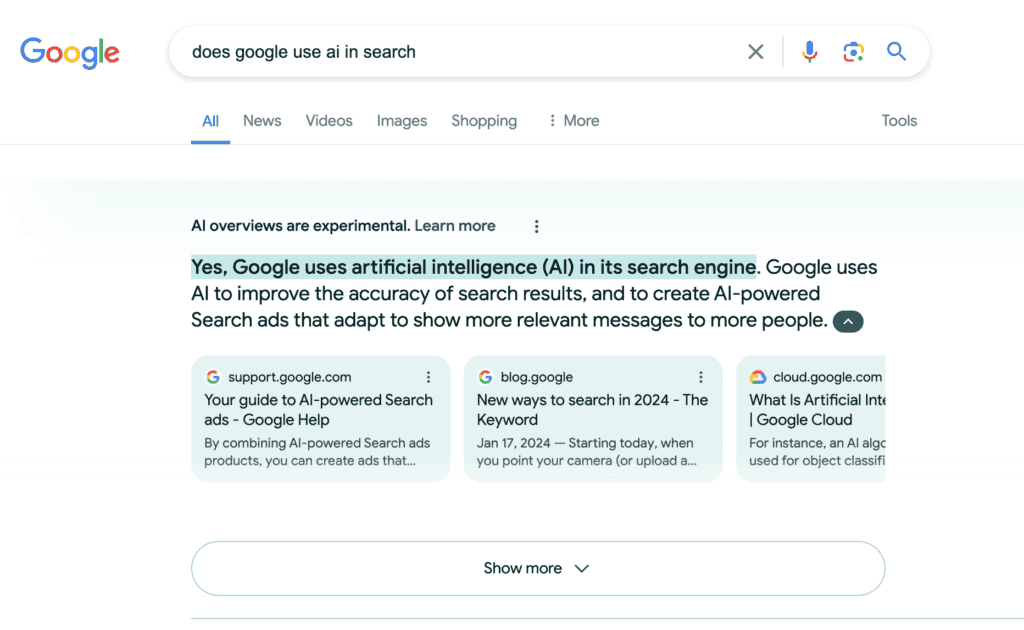
With AI-driven algorithms, SEO strategies must evolve beyond keyword stuffing and basic optimization techniques. Content creators are encouraged to focus on creating quality content that answers questions and provides value based on predicted user intent. This approach not only aligns with AI enhancements but also improves user engagement, which is a key metric for ranking algorithms.
To optimize content for AI-powered search engines, it is important to focus on semantic richness and contextuality. This involves using related keywords and phrases that build a comprehensive theme or narrative around primary keywords. For instance, if the primary keyword is “organic coffee,” related terms could include “benefits of organic coffee,” “organic coffee brewing methods,” and “best organic coffee brands.” This strategy helps AI algorithms connect the dots between various content elements and user queries.
Future Trends
As AI technology continues to evolve, we can anticipate further changes in how search algorithms function. Predictive search capabilities may become more prevalent, where AI anticipates user needs based on past behavior, potentially altering how SEO targets and engages audiences.
By embracing these AI-driven changes, SEO professionals can create more targeted, effective content strategies that align with both technological advancements and user expectations. This alignment is crucial for staying competitive in a rapidly shifting digital landscape where AI plays an increasingly central role in shaping online experiences.
Predictive SEO
Predictive SEO harnesses the power of artificial intelligence to forecast future trends and search patterns, allowing content creators and SEO strategists to prepare optimized content ahead of time. This approach employs data analytics and machine learning algorithms to analyze historical data and predict what users might search for in the future. By understanding these patterns, businesses can create content that is likely to become relevant, thereby staying one step ahead in the SEO game.
One key aspect of predictive SEO is its ability to identify emerging trends before they become mainstream. AI tools analyze vast amounts of search data, social media trends, and even changes in consumer behavior to spot potential interest spikes. For instance, if an AI tool detects a growing interest in a specific technology or product, it can prompt content teams to produce related articles, videos, or blogs right before this topic hits peak popularity. However, few tools go the entire mile of achieving this – a free predictive SEO tool to start with would be Google Trends.
Another significant benefit is the optimization of keyword strategies. Traditional SEO relies heavily on current keyword performance, but predictive SEO evaluates the potential future performance of keywords. This strategy not only improves the visibility of your content when the trend peaks but also helps maintain a consistently high traffic flow, as your content is already aligned with upcoming searches.
Predictive SEO also enhances user engagement by ensuring that the content meets the audience’s future needs. By anticipating user questions and providing answers before they are explicitly sought, businesses can establish themselves as forward-thinking leaders in their respective fields. This preemptive content strategy builds trust and credibility among users.
The integration of AI with SEO practices like predictive SEO represents a shift towards more strategic, data-driven content planning. Instead of reacting to trends, companies can proactively manage their content strategy, aligning it closely with user interests and search behaviors predicted by AI.
This proactive approach not only boosts search engine rankings but also offers a competitive edge in content marketing. By preparing for future demands, organizations can ensure that their content remains relevant and visible, thereby attracting more organic traffic and engaging users effectively over time.
Visual Search Optimization
As online content becomes increasingly visual, optimizing for visual search engines like Google Images or Bing Visual Search is becoming more critical. AI tools can significantly enhance this process by automating and refining how images are indexed and understood by search engines.
Understanding Visual Content with AI
AI technologies, particularly those involving machine learning and computer vision, can analyze an image to understand its content, context, and elements. This capability allows AI to tag and categorize images much more efficiently than manual methods. For instance, AI can identify objects within an image, interpret colors and textures, and even analyze the emotions conveyed by the people in the picture. These detailed insights help in optimizing metadata for images, making them more likely to appear in relevant visual searches.
Optimizing Image Attributes
Effective visual search optimization also involves enhancing various image attributes. AI can automatically adjust aspects like size, format, and resolution to meet the ideal standards for SEO without compromising load times or quality. This optimization ensures that images are not only appealing but also technically prepared to meet search engine algorithms’ requirements.
Enhancing User Experience with AI-Enabled Visual Searches
AI enhances user experience by enabling more intuitive visual search capabilities. For example, users can now take a photo of an item with their smartphones and find similar products or related content immediately. This functionality not only improves user engagement but also increases the chances of conversion as it simplifies the search process. This also means users can take product photos from anywhere and search with Google lens to find a site that sells that product – so have this in mind when choosing product photos and optimising them so your photo can show up for such searches.
Voice Search Optimization
Voice search optimization is rapidly becoming a pivotal element of SEO strategies due to the increasing prevalence of voice-activated devices and assistants like Amazon’s Alexa, Google Assistant, and Apple’s Siri. The unique demands of voice search require a distinct approach to content creation and optimization. Artificial intelligence (AI) can play a significant role in enhancing these efforts, particularly through tools like Konvart, which assist in content planning and writing tailored for voice search.
Understanding the nuances of how people use voice commands can significantly impact how content is optimized. Voice searches tend to be more conversational and longer than text-based queries. For instance, while a traditional search might be phrased as “weather New York,” a voice search is more likely to be “What is the weather like in New York today?” AI can analyze these patterns and help generate content that naturally answers these more conversational queries.
Another critical aspect of voice search optimization is local SEO. A significant percentage of voice searches are for local information. If someone asks, “Where is the nearest coffee shop?” your content needs to be optimized to appear for near me searches, aka in these local search results. So, when answering such questions on your website or creating pages that are targeted at voice search, ensure you go straight to the point and answer the question without writing a multitude of words as introductions. An AI writer like Konvart can help here.
Speed also plays a crucial role in voice search optimization. Voice search devices often prioritize faster-loading pages in their responses. So ensure your website is fast.
Lastly, AI can assist in creating more engaging and contextually relevant content. By analyzing large sets of data on user interactions and engagements, AI can suggest content tweaks that are more likely to resonate with users who prefer voice search. This might include adjusting the tone, style, or structure of the content to better suit spoken language rather than written text.
By leveraging AI in these ways, SEO strategies can be better aligned with the increasing trend towards voice-activated searching, ensuring content not only meets the informational needs of users but is also structured in a way that aligns with how they naturally ask questions. This alignment is key to improving visibility in voice search results and enhancing overall user engagement.
Enhanced User Experience
Artificial intelligence (AI) significantly improves user experience (UX) by enabling more personalized, intuitive interactions on websites. This enhancement is particularly crucial in SEO, where user engagement directly influences rankings and visibility.
Apart from content creation, which most of the world now knows AI can do, advanced use of AI includes website personalization and predictive user engagement. This is something that Amazon uses well.
AI excels in creating a personalized browsing experience for each visitor. By analyzing past behavior, AI can predict what content a user might be interested in or what products they are more likely to purchase. For instance, if a user frequently reads articles on a website about vegan recipes, AI can adjust the website to highlight similar content or suggest related topics or products. This level of personalization not only enhances the user experience but also increases the likelihood of users staying longer on the site, thereby reducing bounce rates and improving SEO metrics. Here are other users on the website:
- Predictive User Engagement — Website search powered by AI can anticipate user queries and offer solutions before the user even completes typing them. This predictive input is based on the analysis of aggregated user data and search patterns. For example, Google’s autocomplete feature improves UX by helping users formulate better search queries quickly, which leads to a more efficient search experience. This capability not only saves time for the user but also makes the interaction with the website smoother and more satisfying.
- Enhanced Content Relevance – AI’s ability to analyze content relevance helps in fine-tuning the information presented to users. By understanding the context and nuances of user queries, AI can help serve the most relevant articles, videos, or products, thereby enhancing the perceived quality of the website. Enhanced content relevance leads to longer visits and more interactions, which are positive signals for search engines.
Navigating the Future of AI-Driven SEO: Dual Forces at Play
Exploring the future of AI-driven SEO involves understanding the dual forces that shape its trajectory: technological advancements and user behavior dynamics. As AI technology evolves, so does its application in search engine optimization, creating a scenario where both elements interact in complex and often unpredictable ways.
Technological Advancements
The pace at which AI technologies are advancing is staggering. Algorithms are not only becoming more sophisticated but are also increasingly capable of understanding and predicting user behaviors and preferences. For instance, AI can analyze vast amounts of data from search engine queries to identify patterns and trends that inform SEO strategies. This capability allows for more targeted content creation and optimization, leading to better search engine rankings and user engagement.
User Behavior Dynamics
On the flip side, user behavior continues to evolve. As internet users become more sophisticated, their expectations for relevant, engaging, and easy-to-access content increases. This shift challenges SEO professionals to continually adapt their strategies to meet these expectations. AI tools can help by providing insights into user intent and satisfaction, which can be used to refine content strategies and improve user experience.
Interplay Between Technology and User Behavior
The interaction between these two forces creates a dynamic environment for SEO professionals. For example, as AI becomes better at interpreting natural language, search engines are placing more emphasis on matching search results with the intent behind user queries rather than just the keywords used. This necessitates a change in how SEO professionals approach keyword research and content creation.
Adapting to Changes
Staying ahead in this changing environment requires a proactive approach to SEO. Professionals must continuously monitor both technological advancements and shifts in user behavior to adjust their strategies accordingly. Leveraging AI-driven analytics tools can provide real-time insights into both areas, enabling more agile responses to emerging SEO trends.
The Current State of AI SEO in 2024
The integration of artificial intelligence into search engine optimization (SEO) has reached a significant level of maturity in 2024. AI technologies are now fundamental in crafting strategies that enhance online visibility and drive organic traffic. This section explores the current state of AI in SEO, focusing on its capabilities, tools, and the implications for content creators and SEO professionals.
AI’s role in SEO has evolved from simple keyword analysis to more complex tasks such as content optimization, search intent recognition, and user experience enhancement. Tools powered by AI can analyze large volumes of data from search engines and social media to predict trends and advise on content that is likely to perform well. This predictive capability allows marketers to stay ahead of shifts in user behavior and preferences.
One of the standout advancements in 2024 is the use of natural language processing (NLP) technologies. NLP helps machines understand human language with greater nuance, enabling them to provide suggestions for content that not only ranks well but also resonates more deeply with readers. For instance, AI-driven tools like Konvart analyze existing content and offer detailed recommendations on how to make it more engaging and SEO-friendly.
Another significant development is the automation of technical SEO tasks. AI algorithms can now more efficiently identify issues such as suboptimal meta tags. By automating these processes, AI frees up SEO specialists to focus on more strategic activities such as content creation and link building.
AI also plays a crucial role in personalization and localization of content. By analyzing user data, AI tools can tailor content to meet the specific needs and preferences of different demographic groups or geographical locations. This level of customization not only improves user engagement but also boosts the effectiveness of SEO campaigns by ensuring that the right content reaches the right audience.
Despite these advancements, challenges remain. The increasing sophistication of AI tools requires continuous learning and adaptation from SEO professionals. They must keep their skills updated to leverage these technologies effectively. Additionally, ethical considerations around data privacy continue to be a concern as AI systems require access to vast amounts of personal information to function optimally.
Wrap Up: Optimize Your Strategies with AI SEO
As we’ve explored throughout this article, AI’s role in SEO is not just promising; it’s profoundly transformative. Leveraging AI for SEO helps you streamline and enhance every aspect of your content strategy, from keyword research and content creation to SEO analysis and user experience optimization.
AI tools like Konvart exemplify how artificial intelligence can revolutionize content planning and writing. By analyzing large datasets faster than any human could, AI provides insights into trending topics, keyword opportunities, and audience preferences. This allows content writers and SEO executives to craft strategies that are not only data-driven but also highly efficient and targeted.
Furthermore, AI’s ability to learn and adapt continuously means that your SEO strategies can evolve at the pace of search engine algorithms themselves. This agility is crucial in a landscape where staying ahead of SEO trends translates directly into better search engine rankings and greater online visibility.
In conclusion, integrating AI into your SEO practices offers a significant competitive advantage by making your strategies more dynamic, insightful, and effective. Whether you’re a content writer seeking to create precisely targeted articles or an SEO executive aiming to refine a digital strategy, AI tools like Konvart provide the capabilities necessary to meet your goals.
So, start experimenting with these technologies to discover how they can enhance your content quality and SEO performance. Remember, the future of SEO is here with AI leading the way—make sure you’re not left behind.
FAQs
Can SEO Specialists be replaced by AI?
While AI can assist in automating certain aspects of SEO, such as keyword research and content optimization, it cannot completely replace the need for human expertise in SEO. SEO involves a combination of technical knowledge, creativity, and understanding of user behavior, which AI may not fully replicate. Therefore, while AI can enhance SEO efforts, it cannot entirely replace the role of SEO professionals.
What AI tools are available for SEO optimization?
There are several AI tools available for SEO optimization, including tools for keyword research, content optimization, link building, and website analysis. Some popular AI tools for SEO include Konvart, MarketMuse, and Clearscope, which can help businesses improve their search engine rankings and drive more organic traffic to their websites.
How does AI impact content creation for SEO purposes?
AI can impact content creation for SEO purposes by helping businesses generate high-quality content that is optimized for search engines and tailored to meet the needs of their target audience. AI tools can analyze data, trends, and the SERPS to answer questions and use the keywords and content formats that are likely to perform well in search results and engage users.
What are the limitations of using AI for SEO optimization?
Some limitations of using AI for SEO optimization include the potential for bias in data analysis, the lack of human creativity and intuition in content creation, and the need for ongoing monitoring and adjustments to ensure optimal results. Additionally, AI tools may not always be able to keep up with rapidly changing search engine algorithms and user behavior trends, requiring human intervention and oversight to achieve long-term success in SEO optimization.

